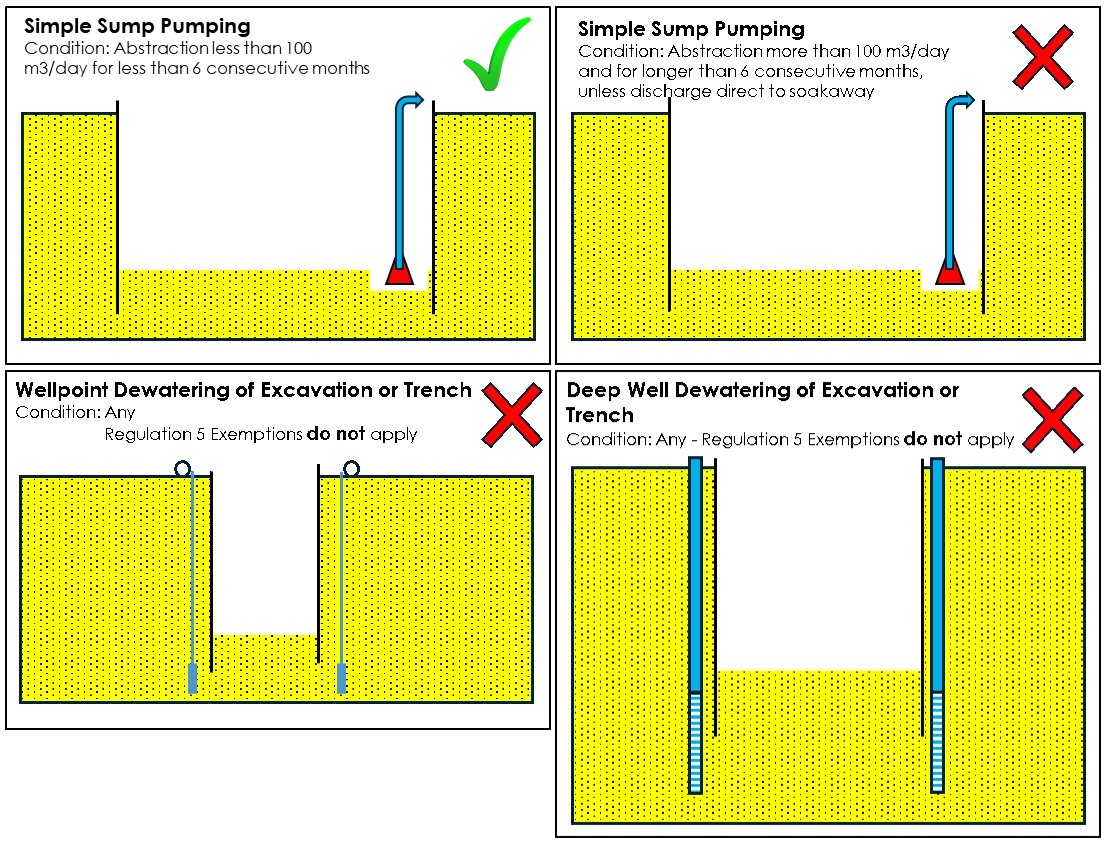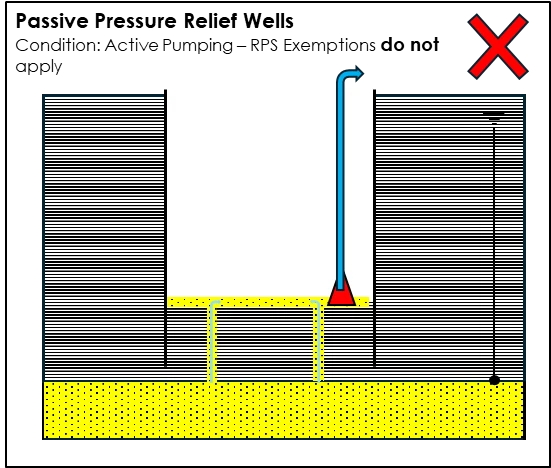
- +44 (0)1953 454540 enquiries@stuartwells.co.uk
Loading ...

From 1st January 2018, the Water Abstraction (Transitional Provisions) Regulations 2017 removed previous exemptions for construction dewatering from environmental regulation control.
Although there are certain exemptions for construction dewatering under the Water Abstraction and Impounding (Exemptions) Regulations 2017 Water Abstraction and Impounding (Exemptions) Regulations 2017. It is a common misunderstanding that this applies to specialist dewatering methods. Regulation 5 exemptions do not apply to boreholes, wells or wellpoints and in for projects in England & Wales where dewatering is required a groundwater abstraction licence needs to be in place.
You legally cannot commence pumping until all required licences and consents are in place. Therefore, it is important that you are aware of this risk and leave sufficient time to obtain the required licences. Stuart Wells can oversee and undertake the licencing application process for you. Please contact us for more information and to discuss on how we can assist.
Construction Dewatering Scenarios – Abstraction Licence Exemptions Guide

Information on and updated EA fees and charges can be accessed from the following link: Environmental permits and abstraction licences: tables of charges.
Environmental Regulations regarding discharge of groundwater from temporary dewatering operations to surface water are set out in EA Guidelines document RPS 262 Temporary dewatering from excavations to surface water: RPS 261. There are listed exemption conditions, and we would advise you contact us for more information and to discuss on how we can assist, but to simplify, the RPS potentially allows groundwater discharge to surface water for no more than 3 consecutive months 3 months provided the discharge is uncontaminated and clean with plans and control measures for silt, disposal and use machinery in excavations while dewatering is taking place. There is also a requirement to keep records for 2 years that show you have complied with the RPS .
Should the discharge period go beyond 3 consecutive months, or the discharge point is less than 500m upstream of a SSSI, SAC, SPA, site of community importance or Ramsar site. RPS 262 does not apply, and a bespoke environment discharge permit will be required. New bespoke environmental permit: application forms (England).
Discharge to Utility Outfall (Sewer etc...)Should discharge be to a utility outfall you do not need an environmental discharge permit. However, a trade effluent discharge permit from the utility company or authority will be required. Most water companies use a wholesaler to manage the application and once you have a consent, you must comply with all its conditions. Normally a cost/m3 of discharge applies with regular inspection and monitoring. We would advise you contact us for more information and to discuss on how we can assist.
All groundwater abstraction and discharge in Scotland is regulated by the SEPA (Scottish Environment Protection Agency).
AbstractionGroundwater abstracted from dewatering is regulated in Scotland by the Water Environment (Controlled Activities) (Scotland) Regulations 2011 (more commonly known as Controlled Activity Regulations (CAR). Abstractions - Water resource authorisations and data returns.
Temporary groundwater abstraction for construction dewatering abstraction is regulated initially through general binding rules (GBR15) detailed in The Water Environment (Controlled Activities) (Scotland) Regulations - A Practical Guide v9.4 (July 2024), If the conditions of GBR15 cannot be met authorisation and an abstraction licence by SEPA will be needed for dewatering operations. Unlike England & Wales well(s) or borehole(s) are considered and form part of the GBR. Please contact us to check if any potential dewatering operation falls in or out of the GBR. Other conditions include:
Groundwater abstraction licences have differing designations formats depending on abstraction flow. For most dewatering projects its falls within either a ‘simple licence’ for abstractions >50 and ≤ 2000m3/day and a ‘complex’ licence for abstractions > 2000m3/day.
Stuart Wells can oversee and manage the whole process and complete the necessary forms and detailed information required for SEPA to acquire the required license. A licence application requires Form’s A and D1 with SEPA having a 4 month determination period. The licence will include a fee that has significant increases, dependant on volume and use.
Discharge to Surface Water (Rivers, Streams etc...)Scotland, if you discharge anything to the water environment you may require an authorisation from SEPA. Some discharges are authorised if you comply with the general binding rules (GBR). detailed in The Water Environment (Controlled Activities) (Scotland) Regulations - A Practical Guide v9.4 (July 2024), Authorisation from SEPA is not required for discharges of uncontaminated groundwater abstracted directly through boreholes/well pointing and discharged without contact with any other drainage run-off, in order to dewater construction sites, however pollution control measures will need to be in place, Our advice would be to contact us for clarification on if SEPA registration and potential licences need to be gained.
Discharge to Utility Outfall (Sewer etc...)>If discharge is to the public foul drainage system provided by Scottish Water the sole water utility provider in Scotland. As groundwater is deemed to be a trade effluent, an application to discharge trade effluent needs to be made. Once you have a consent, you must comply with all its conditions. Normally a cost/m3 of discharge applies with regular inspection and monitoring. We would advise you contact us for more information and to discuss on how we can assist.
All groundwater abstraction and discharge in Northern Ireland is regulated by the NIEA (Northern Ireland Environmental Agency.
AbstractionGroundwater abstracted from dewatering is regulated with the Water Abstraction and Impoundment (Licensing) Regulations (Northern Ireland) 2006. There are differing levels of authorisation, with most dewatering projects with an abstraction rate of > 100m3 per day authorisation is granted as a formal “complex” licence which may have additional monitoring conditions. https://www.daera-ni.gov.uk/publications/application-licence-abstract-or-impound-water Normally the timeframe to receive a permit is within 4 months from receipt.
DischargeUnder the Water (Northern Ireland) Order 1999, the discharge of groundwater to any waterway requires the consent of the Department of Agriculture, Environment and Rural Affairs. https://www.daera-ni.gov.uk/articles/regulating-water-discharges. If discharge is to the public foul drainage system provided by NIW, the sole water utility provider in Northern Ireland, with submission of an application for trade effluent and site drainage discharge consent: WO1 Annex 2 https://www.daera-ni.gov.uk/publications/application-trade-effluent-and-site-drainage-discharge-consent-wo1-annex-2.
Pumping Test RegulationsIn England & Wales to enable a pumping test to be undertaken an EA Groundwater Investigation Consent (GIC) will be required. Apply for consent to investigate a groundwater source This includes permission to construct the borehole(s), and undertake the proposed pumping test, which may include additional monitoring or flow conditions.
Please note that although the GIC will detail the discharge location, it does not include a permit to discharge. In most cases discharge permitting will fall under RPS 262 conditions https://www.gov.uk/government/publications/temporary-dewatering-from-excavations-to-surface-water/temporary-dewatering-from-excavations-to-surface-water. If not a bespoke discharge permit will be required or in the case of discharge to utility outfall a trade effluent discharge permit from the utility company or authority.
Stuart Wells can oversee and manage the whole process. We would look to discuss the proposals with the EA and prepare a supporting document (if required) which would provide additional information and a document of relevance to the application. Where necessary, this would also include a technical note and information on the proposed pumping test with schematic layout drawings. A Water Feature Survey will be required as part of the process. Please note the application process normally takes 2 weeks for the required pre-application work, with the EA normally taking a further 4-6 weeks to approve.
In Scotland to enable a pumping test to be undertaken consent will be required for abstractions greater than 50m3/day. An application for registration is submitted https://www.sepa.org.uk/media/287009/wat-app-reg-07.pdf. A Water Feature Survey and details of test pumping methodology are then sent to SEPA for agreement prior to test pumping to ensure adequate data is gathered to support any future licence level application. SEPA normally takes 4-6 weeks to approve.
We would advise you contact us for more information and to discuss on how we can assist.
Copyright © 2024 Stuart Wells Limited, all rights reserved.